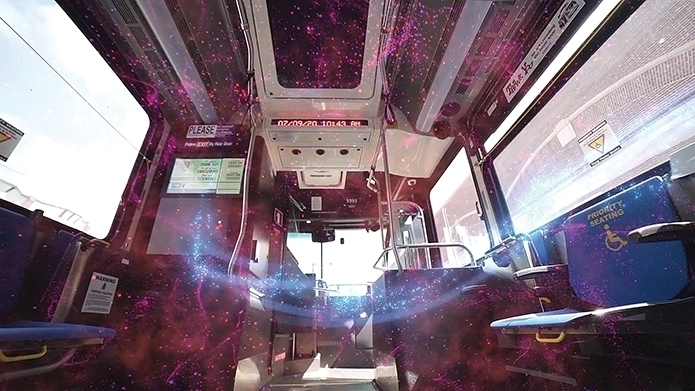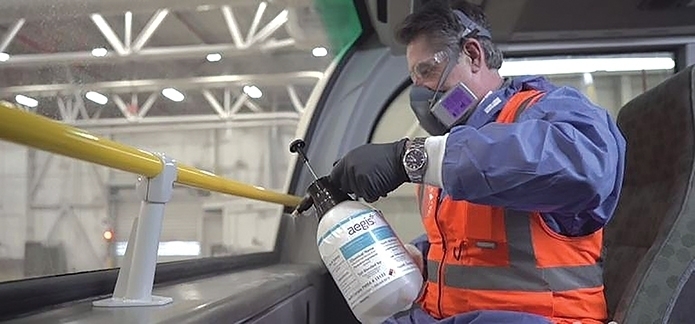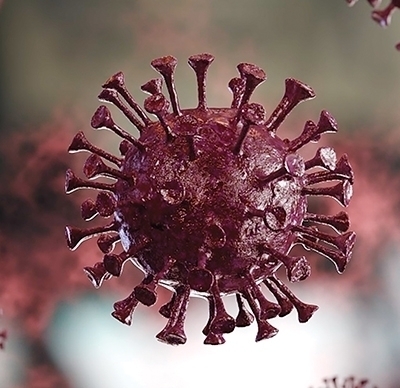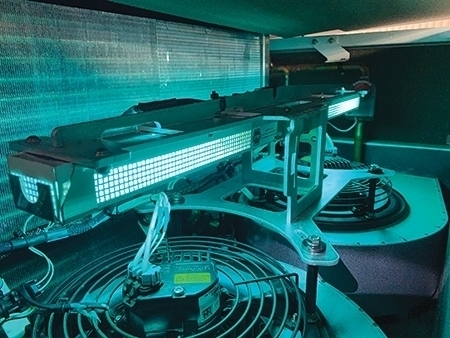
By combining Active Air Purification with antimicrobial surface treatments, the company is pursuing a multi-tiered approach to post-pandemic transit safety
For United Safety, the spread of COVID-19 throughout the nation – and the ensuing challenges which statewide lockdowns placed on bus travel – was the catalyst for a new, multi-tiered approach to help the public transit and intercity coach industries face a new paradigm.
“It was quickly apparent to us that boosting ridership and restoring confidence in bus transportation would require a multi-level treatment for each vehicle – applied to both the air as well as onboard surfaces,” said Jeff Krueger, vice president of field operations for United Safety.
Krueger said that the United Safety team knew right away this holistic philosophy for COVID response would require multiple technologies not then-currently available for buses. United Safety President and CEO Joseph Mirabile ignited a rapid but extensive research process to bring together a ‘Whole Bus Solution’ for its customers and riders.

Active Air Purification
Because COVID-19 is transmitted through aerosols, onboard air treatment quickly became a critical priority for public transit, paratransit, commuter, and intercity bus transportation.
The company did not have a pre-selected product in mind for air purification, allowing the research team a “clean slate.” Their only directive was to enhance onboard safety for bus passengers as effectively as possible.
Krueger said the team interviewed approximately 30 companies, focusing on three main criteria: the technology had to be proven effective and in-use in another industry; it could not be limited to use in static situations (such as nighttime or off-hours cleaning); and the technology had to translate across multiple markets cost-effectively – including public transit, school buses, and emergency first-response.
 After the exhaustive research process, United Safety entered a partnership with RGF® Environmental Group, Inc. to bring Active Air Purification to bus transportation. RGF – a 35-year-old company which manufactures over 500 environmental products – provided the ultraviolet photohydroionization (UV-PHI®) technology which powers the Active Air Purification System.
After the exhaustive research process, United Safety entered a partnership with RGF® Environmental Group, Inc. to bring Active Air Purification to bus transportation. RGF – a 35-year-old company which manufactures over 500 environmental products – provided the ultraviolet photohydroionization (UV-PHI®) technology which powers the Active Air Purification System.
The PHI® process creates low-dose hydrogen peroxides which then get dispersed into the air within the bus, where they attack and eliminate airborne pathogens such as the SARS-CoV-2 airborne molecules, the virus that causes COVID-19. The system continuously purifies onboard air so that it “mimics” natural, outdoor air, where transmission of COVID-19 and other viruses is very rare. Although it is a new concept for American bus transportation, PHI® technology is widely used in government buildings by the FBI, CIA, military facilities around the country, and even in Chipotle locations across the United States, to prevent virus and bacterial spread.
Krueger added that the Active Air Purification system produces levels of hydrogen peroxide that are only 2 percent of OSHA’s recommended maximums for contained environments, and that the system is safe for the materials of a bus’s interior.
“The basic approach by most systems was enforcement of mask compliance and physical distancing – which, by themselves, create a major challenge in public transit,” said Ray Melleady, executive vice president, seating and technology, at United Safety. “There is only so much space in a bus, and everyone is still breathing each other’s air. Photohydroionization allows us to take the battle to those air particles, in a way that is highly effective at stopping bacterial and viral pathogens but completely safe for human occupants. Without getting too technical, we are replicating nature’s air treatment but in an enclosed space.”

In onboard test environments, the system is maintaining bacteria levels equivalent to hospitals and food processing centers – even without daily disinfection. This is a result of the system’s ability to engineer outdoor air quality indoors.
The only required system maintenance is an annual cell replacement (the cell consists of the UV bulb and the catalyst agent) which takes approximately 30 minutes.

“Millions of buildings in America have been using this technology for decades, and now it is our job to deploy it as quickly and meaningfully as possible aboard vehicles,” Mirabile said. “If PHI® technology had been deployed on pre-pandemic transportation, we would have had a much better chance at stopping the spread in public environments.”
Green Bay Metro, serving over 3,000 riders per day in Wisconsin, was the first transit system to install Active Air Purification on its entire fleet. Patty Kiewiz, transit director for Green Bay Metro, said that the system initially dropped to 30 percent of its normal ridership when COVID struck. She said that acquiring Active Air Purification was aimed at restoring rider confidence in transit.
“We have received so much positive feedback from employees and riders already,” she said. “So far, riders have commented that they like the system’s active nature, and that we are not constantly spraying down the buses. The onboard systems tell our riders that Green Bay Metro has their safety top-of-mind.”
United Safety announced in August an exclusive partnership with REV Group to provide Active Air Purification to the group’s fire brands in the first responder market. Furthermore, last month United Safety announced a partnership that will make Active Air Purification available on future GILLIG transit bus procurements.
AEGIS® Microbe Shield
Though the search for effective air treatment involved a blank slate, United Safety was already in the process of innovating onboard surface treatments when the pandemic struck. The company debuted AEGIS® Microbe Shield, an antimicrobial surface treatment based on nanotechnology.
After the microbe shield is applied to a surface, it essentially creates a surface barrier that lasts for six months or longer (depending on usage) which Mirabile described as “like a microscopic bed of nails.” The layer is invisible, and not detectable to human touch – but it effectively punctures and kills 99 percent of bacterial particles with which it comes into contact.
United Safety is also treating all its seating products with a layer of AEGIS® Microbe Shield.
“For a few years now, we have seen AEGIS® as a product which helps the transit market maintain cleaner onboard environments – such as grab handles, seats, and stanchions – in between regular cleaning cycles,” Melleady said. “Most transit systems have traditionally disinfected buses once per week, with deep clean disinfections occurring once per month. This technology allows agencies to keep surfaces extremely clean from pathogens in between those cleaning cycles.”

“A one-two punch”
Melleady said that by combining Active Air Purification with AEGIS®, United Safety aims to create a dynamic antimicrobial environment to fight viruses and bacteria and restore rider confidence in bus travel.
Each technology represents a one-time investment. Krueger explained that the real cost-benefit is that these systems allow for agencies to save on human resources (for multiple per-day cleanings) and cleaning equipment. While acquisition costs are neutral with competing disinfection technologies, the effectiveness becomes clearer when compared to the opportunity costs incurred by deep-clean disinfections for every vehicle each night. The hope, Krueger said, is that agencies can begin returning to a cleaning process which more closely resembles pre-pandemic operations.
Daily COVID cleaning not only requires extraordinary time and labor, but the cleaning chemicals themselves can have a significant negative effect on vehicles, Mirabile added.
“We have seen interior materials degrading on buses exposed to heavy-duty cleaners, which can have long-term impacts on vehicle maintenance,” he said.
The company continues to research new ways to fight COVID-19 transmission aboard buses, and to form new partnerships. Most recently, United Safety inked a deal with Kontrol Solutions to distribute its BioCloud machine. BioCloud continuously samples the air in a given environment and will display an audio and visual alert if it detects COVID, SARS, or other airborne viruses.
“We want people to know they are safe,” Mirabile said. “That peace of mind is critical in helping people regain confidence in their ability to use clean and safe transportation.”
